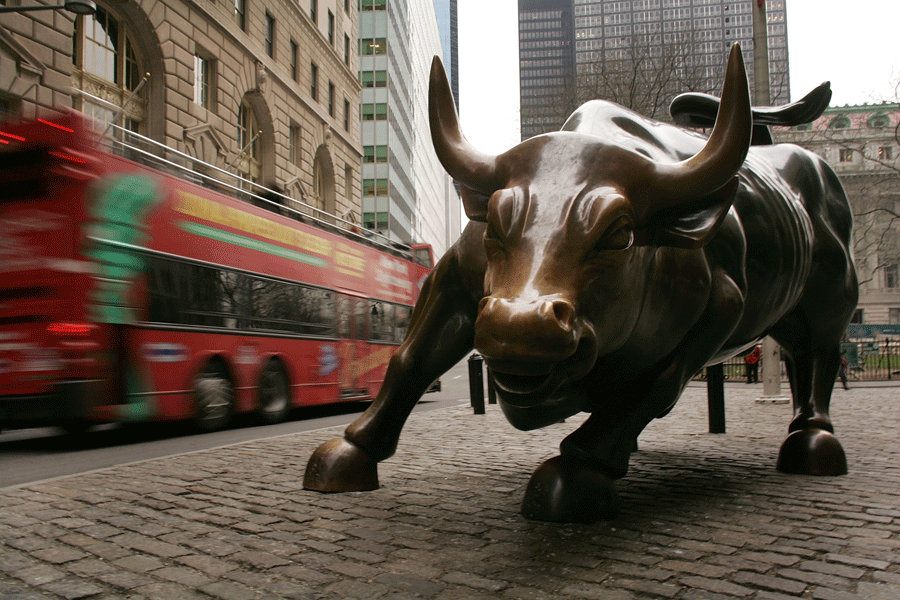Wall Street Tensions Mount Over Fed Rate Cut Predictions
17.07.2024 10:00 2 min. read Alexander Stefanov
Wall Street is increasingly frustrated with the Federal Reserve's interest rate strategy, highlighted by Bank of America's recent results.
The bank’s management anticipates the Fed will cut rates by a quarter point in September, November, and December. However, their chief economist, Michael Gapen, expects just one 25-basis-point cut in December, though he now sees potential for an earlier cut after June’s lower inflation data.
Market expectations have shifted, with derivative contracts indicating two rate cuts starting in September and a 50% chance of a third cut by year-end. This reflects wider uncertainty, as economists advising clients often have different views from their management. Gapen’s outlook is one of the more conservative among major U.S. banks.
Previously, a single quarter-point cut by December was a common forecast, but Barclays, BNP Paribas, Deutsche Bank, and JPMorgan have adjusted their expectations to match market sentiment more closely. Traders are now almost certain the Fed will cut rates by September. The CME FedWatch tool shows a 93.3% probability that the federal funds rate will drop to 5% to 5.25% in September, down from the current 5.25% to 5.50%.
June’s consumer price index update, which showed a 0.1% month-over-month decrease, brought the annual inflation rate to 3%, the lowest in three years. A month ago, the likelihood of a September rate cut was about 70%. This significant change was driven by the favorable inflation data.
Fed Chairman Jerome Powell has indicated that the central bank will act by September. On Monday, Powell stated that the Fed wouldn’t wait for inflation to hit its 2% target before cutting rates, citing the lag effects of previous tightening measures. He emphasized that the Fed seeks greater confidence in inflation returning to 2%, noting recent favorable inflation data as a positive sign.
-
1
USA-China Trade Truce Sparks Crypto and Stock Market Optimism
13.05.2025 9:00 1 min. read -
2
China Dumps U.S. Treasuries as Global Holdings Hit Record High
19.05.2025 14:00 2 min. read -
3
Brazil Pours Cold Water on BRICS Currency Hopes, Citing Major Asset Gap
22.05.2025 10:00 1 min. read -
4
This Country Just Banned the U.S. Dollar in Domestic Transactions
19.05.2025 19:00 2 min. read -
5
Japan Faces Mounting Financial Stress as Bond Market Cracks
20.05.2025 9:00 1 min. read
Trump Reignites Trade War, Accuses China of Breaking Deal
The trade standoff between the U.S. and China took a sharp turn on Friday after President Donald Trump accused Beijing of breaching a recently struck economic agreement.
Wall Street Analyst Sees Bright Side of Ballooning U.S. Debt
Despite growing concerns over America’s swelling budget deficit, Citigroup’s U.S. equity strategist Scott Chronert believes the situation could bring short-term gains to the broader economy—even if it comes at a cost to market valuations.
Robert Kiyosaki Warns of Economic Breakdown, Calls Bitcoin a Lifeline
Robert Kiyosaki, author of Rich Dad Poor Dad, is sounding a dire alarm over what he describes as the beginning of financial chaos in the U.S.—a scenario he believes will wipe out millions financially.
Billionaire Warns U.S. Debt Crisis Could Deepen After New Bill
Billionaire investor Chamath Palihapitiya is sounding the alarm over a new piece of legislation that he believes could accelerate America’s financial decline.
-
1
USA-China Trade Truce Sparks Crypto and Stock Market Optimism
13.05.2025 9:00 1 min. read -
2
China Dumps U.S. Treasuries as Global Holdings Hit Record High
19.05.2025 14:00 2 min. read -
3
Brazil Pours Cold Water on BRICS Currency Hopes, Citing Major Asset Gap
22.05.2025 10:00 1 min. read -
4
This Country Just Banned the U.S. Dollar in Domestic Transactions
19.05.2025 19:00 2 min. read -
5
Japan Faces Mounting Financial Stress as Bond Market Cracks
20.05.2025 9:00 1 min. read


